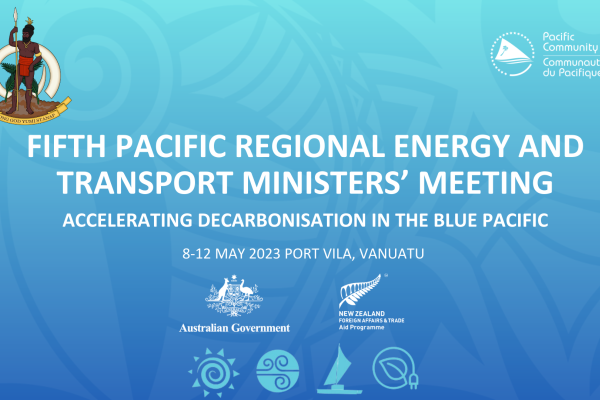(Contenu disponible en anglais uniquement)

Good morning Honourable Ministers, High Commissioners and Ambassadors, Senior Government Officials, Heads and representatives of development partners, private sectors, CSOs/NGOs, distinguished guests, ladies and gentlemen.
Welcome to Port Vila, Vanuatu and it is my utmost pleasure to be opening this meeting of Ministers of Energy and Transport. As the host of this 5th PRETMM, thank you for accepting our invitation to attend this very important Ministerial.
We invited you to discuss what is needed for a Just Transition in the Pacific. While the concept of a Just Transition has been around for a while, it has not been discussed very much in the Pacific. As Vanuatu is leading the call for a Just Transition, it is our responsibility to be clear on what we mean. So let me start by saying what it is not.
A Just Transition is NOT just another term for new obligations to reduce greenhouse gas emissions. Most of us already have ambitious goals on the books and struggle to pay for them. The nearly three-decade pattern of ratcheting up those goals higher and higher does little if the finance needed for implementation is not available.
In fact, a Just Transition is not even really about climate. As Small Island Developing States, we face a wide range of development challenges - some by virtue of our small size and relative isolation. But many more are caused by how the global economy is structured, which disadvantages us today, despite the fact that our people somehow lived sustainably on our islands for hundreds, and sometimes thousands of years.
The existing financial system makes it difficult for us to fund basic infrastructure and essential government services, and more often than not, drives us deep into debt. It forces us to sell our natural resources for cheap and limits our ability to climb the ladder of development to higher value-added industries. And it traps us in unsustainable consumption patterns that pollute our air, our water, and our land.
As a result, too many of our people are left with low wages, a poor education, and poor health.
Of course, climate change is perhaps the most UNJUST product of this global economy, which poses an existential threat to our communities.
So what is a Just Transition? A Just Transition begins with recognizing the structural elements of the global economy that place us in these vulnerable circumstances. A Just Transition begins with recognizing that too many developing countries were excluded from the benefits of fossil fuel-powered economic growth over the last two centuries. And it begins by being very clear that the renewable energy transition, and the global economic reordering that will necessarily come with it, must enable even the most vulnerable countries to survive and thrive.
Energy and transport are the two most fundamental sectors of the global economy, and therefore they will be two of the most important sectors in a Just Transition. We all know that fossil fuel use and price volatility greatly distort our domestic economies. It is like a huge international tax that undermines our ability to make productive investments in our countries. Fossil fuel consumption is also the driver of the biggest security threat to our counties in climate change.
As we climb out of the fossil fuel finance trap, we must avoid falling into a new trap by building new, low-carbon energy systems that are nonetheless still unfair and unsustainable. We must build new systems - domestically, regionally, and internationally - that enable all countries to achieve their full range of development priorities. That means we need to be very clear about our finance, technology, and capacity-building needs, and we need to reform and strengthen the institutions necessary to provide for them.
What would those systems look like? How would it unlock our development potential in the region? And how can we build and pay for them without being driven further into debt? Those are the questions I hope we can begin to address at this meeting. These are the elements of "Justice" in a Just Transition.
Let us be frank: the Pacific Island Countries represented at this meeting could all reduce their emissions to zero tomorrow, and it would not make a lick of difference in the global effort to address climate change. We are simply too small to bend the emissions curve even in the slightest. Yes, our actions do inspire some, but that alone is not enough to justify the enormous time, money, and effort necessary to transform our energy and transport sectors.
But an energy transformation is still worth pursuing. Why? Because I believe a decisive move away from fossil fuels is the best path - the only path - to a more fair, equitable, and just economy.
